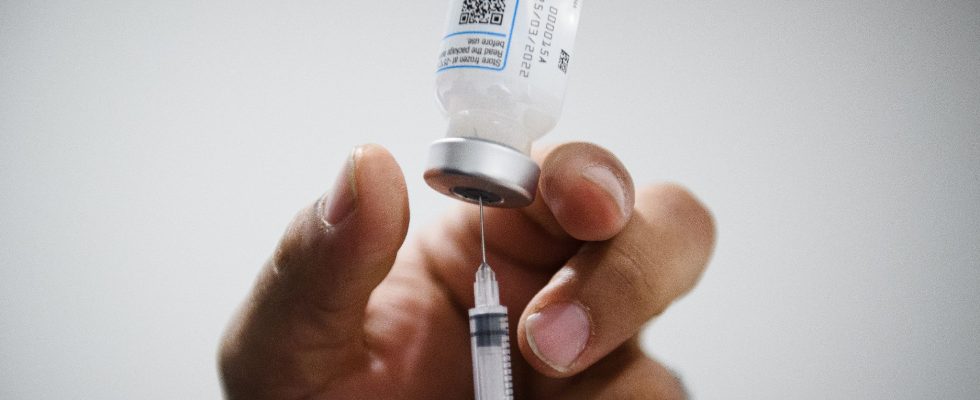It’s a busy start to the school year from a vaccination point of view… Babies against bronchiolitis, vulnerable people against Covid-19 and the flu, adolescents against papillomaviruses: the fall will be marked by several health campaigns. What injections and for whom? Decryption.
Preventive treatment against bronchiolitis for babies
Faced with respiratory syncytial virus (RSV), the main cause of bronchiolitis, preventive treatment (which is not a vaccine) will be available for infants from mid-September. 200,000 doses have been ordered. With the injection of a monoclonal antibody (Beyfortus, developed by Sanofi and AstraZeneca), the objective is to provide babies with means of immune defense for their first season of exposure to RSV.
It could be a new “hope” for babies, according to Christèle Gras-Le Guen, president of the French Pediatric Society and head of the general pediatrics department at Nantes University Hospital, and relieve the hospital. The seasonal RSV epidemic reached a record level in more than a decade last winter with 35,000 babies hospitalized, including 2,500 in critical care.
For infants born from September 15, the single injection will be offered before leaving the maternity ward. Parents of children born since February will also be able to have the treatment prescribed, collect it from a pharmacy and have it injected by a doctor, nurse or midwife. In France, bronchiolitis affects nearly 30% of infants under two years old each winter, or around 480,000 cases per year. And 2 to 3% of infants under one year old are hospitalized for severe bronchiolitis.
In addition to an information campaign on bronchiolitis intended for parents, the deployment of preventive treatment against bronchiolitis will constitute “one of the major challenges of the start of the school year”, declared the new Minister of Health, Aurélien Rousseau, at the beginning of August.
The papillomavirus vaccine for adolescents
The widespread vaccination of students in 5th grade against the papillomavirus, promised at the start of the year by President Emmanuel Macron, will begin this fall after obtaining parental consent. The start of this vaccination, fully covered by Social Security, is scheduled for October 2 in the most advanced regions, such as New Aquitaine, in public colleges and private colleges under voluntary contracts. Students who have obtained this parental permission will then receive the first dose “between October and December”, then the second (six months apart) “between April and June”, each time in their college and “during school time”. .
Students with parental authorization will receive the first dose this fall/winter, the second six months later, in their college and during school time. The injections will be given by mobile teams of caregivers from outside the establishment. Two vaccines are available: Gardasil 9 (MSD laboratory) and Cervarix (GSK).
Human papillomaviruses (acronym HPV in English) are the cause of nearly 6,500 new cases of cancer (uterus, vagina, penis, throat, etc.) each year in France among women but also men. According to a report from theAcademy of Medicine dating from 2019, “the health cost of HPV infections represents more than 500 million euros per year”. In an article published in The Lancet Global Healthin mid-August, it was established that 21% of men over the age of 15 carry a type of HPV that is potentially oncogenic and very contagious.
Vaccination, which prevents up to 90% of HPV infections causing cancer, has been recommended for girls aged 11 to 14 since 2007, and for boys since 2021. But less than half of French adolescents are protected, one of the lowest rates in Europe. The government is targeting 80% vaccination of this age group by 2030.
Covid-19 and flu: a new vaccination campaign
The new vaccination campaign against Covid-19 will start on October 2. Initially scheduled for the 17th, its launch was brought forward by the Minister of Health, in view of the resumption of the epidemic. It follows the recommendation issued by the Committee for Monitoring and Anticipation of Health Risks (Covars), which it had received a few days earlier. From the 17th, the parallel launch of the vaccination campaign against seasonal flu remains planned.
These two vaccinations are recommended for those most at risk (65 years and over, pregnant women, people who are immunocompromised or with comorbidities such as chronic illnesses, nursing home residents, etc.) and people who come into contact with them, such as caregivers.
French people outside of these categories who would like an anti-Covid booster will be able to benefit from it free of charge. The time limit to be respected after the last injection or Covid infection remains at least six months. Vaccination can be administered by a doctor, a nurse, a midwife or even in a pharmacy, or even on site in a nursing home.
On the Covid side, “two messenger RNA vaccines developed during the spring by the Pfizer and Moderna laboratories as well as a recombinant particle vaccine, developed by Novavax” will be available, declared the president of Covars Brigitte Autran a few weeks ago . In addition to Covid and the flu, older people can also suffer serious effects from the virus responsible for bronchiolitis.
